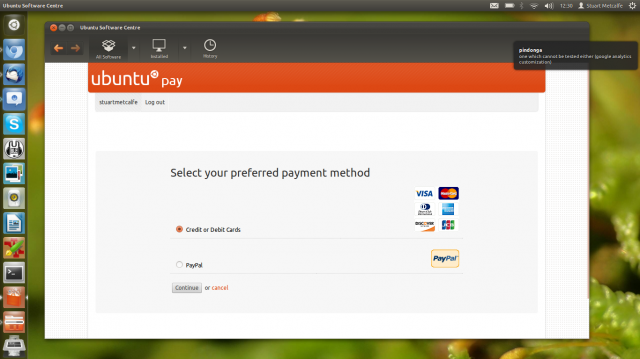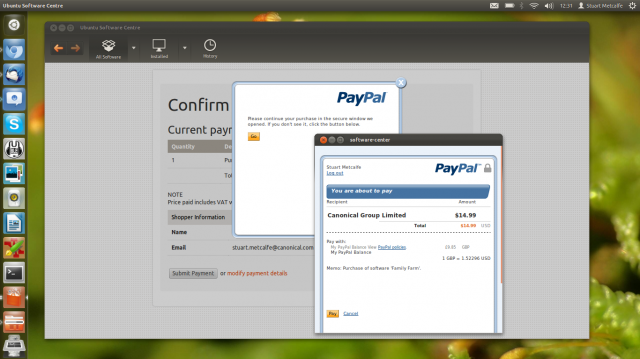PayPal Support to Enhance Ubuntu Software Center
The Ubuntu Software Center, Canonical’s take on the app store concept, is slated to move a step closer to the big leagues by the end of December 2011 with the implementation of support for PayPal. Here’s the scoop, and why it matters.
According to Canonical, Ubuntu Pay, the service that facilitates the purchase of those applications in the Ubuntu Software Center that cost money, will allow payment via PayPal “before Christmas,” if all goes according to plan. Canonical released some screenshots of the feature in action:


Joining the Big Leagues
Currently the only way to pay for applications in the Software Center is via debit or credit card. I’d bet that works for most people, but adding PayPal support is a major step up for Canonical.
For the record, I’m no PayPal fan. I distrust financial services in general, but I have a particular rancor for PayPal, which earlier this year froze my account in France on charges that I may have been money laundering. It engendered a long ordeal that made French state bureaucracy seem friendly and efficient by comparison, and which battered my tender ego as a potential criminal financier. If only I were lucky enough to have money to launder, I’d hope I’d be sophisticated enough to do it in a classier way than via a French PayPal account.
Also, PayPal’s rates for foreign transactions are kind of steep, which is not cool. And its participation in the WikiLeaks embargo is pretty bogus.
But personal anecdotes and thoughts aside, the availability of PayPal support for Ubuntu Pay enhances the legitimacy of the Software Center. That’s important for users new to Ubuntu, or to app stores in general, who might be skeptical about electronically forking over cash to an ambiguous entity on the other end of a program that came with their free operating system.
After all, the payment process in the Software Center currently doesn’t make it very clear at all exactly whom you’re buying from or what your rights are as a customer. If I hadn’t been using Ubuntu now for half a decade without being fleeced yet, I’d probably be wary about trusting the service.
At the same time, PayPal is also vital to helping Canonical build stronger relationships with third-party developers, many of whom will doubtless appreciate the new payment option. And since the willingness of independent programmers — both inside the open source channel and beyond — is key to Ubuntu’s longevity as a sustainable platform, making life as easy as possible for developers is paramount.
About the Author
You May Also Like


